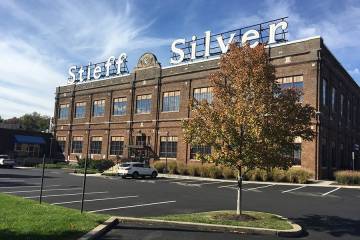An FBI investigation related to a noose found last summer in a construction area of a Johns Hopkins University-owned building has been closed, the university said today, with the bureau unable to find sufficient evidence to pursue charges "despite extensive efforts." An independent investigation led by JHU's Office of Institutional Equity was also unable to conclusively determine who was responsible.
The rope fashioned into a noose was discovered July 2 by a nonaffiliate at a construction site in the Stieff Silver building, a research facility located in Baltimore's Remington neighborhood where renovations of a Whiting School of Engineering laboratory were taking place.
"We approached this as a hate crime and had hoped that the investigations would bring to justice those who would wield such a despicable symbol of hate and violence toward Black Americans," Shanon Shumpert, vice provost for institutional equity; Connor Scott, acting vice president for security; and Bob McLean, vice president of facilities and real estate wrote in a message to the Hopkins community today. "At the same time, we were determined to go beyond the investigation in our actions, and we want to report to you on steps we have taken to help safeguard our employees and contractors from racially threatening or discriminatory incidents, and to ensure that our workplaces embody our institutional values."
Those steps included providing "immediate and ongoing support to those who were on site and directly impacted" by the incident and working to ensure that all individuals can feel welcome in all Johns Hopkins spaces.
As part of that effort, the university:
- Established new requirements for the response and reporting of all racially threatening or discriminatory incidents by third-party design and construction professionals working at our facilities, and reiterated the university's anti-discrimination policies and procedures and strong, proactive commitment to diversity and inclusion. These requirements are now included in Johns Hopkins Facilities and Real Estate construction solicitations and contracts.
- Held its first symposium for our vendors on our anti-discrimination policies and the broader topic of diversity, equity, and inclusion, attended by 73 representatives of JHU vendors in the design and construction industries. Johns Hopkins officials and vendors discussed the importance of economic inclusion to the university, and representatives of participating firms addressed the value of a diverse workforce, as well as best practices in training and incident response, particularly in the context of a hate crime or other serious circumstance.
- Launched a work group to develop non-discrimination and diversity and inclusion guidelines for all JHU vendor contracts, requiring fair and equitable treatment for all and setting standards for policies, education, and training. More detailed requirements also are in development for major vendors such as food service, transportation, security, and large construction projects.
- Required the visible posting of SPEAK2US hotline posters at all JHU construction sites, to ensure workers know that anonymous reporting of incidents or concerns is welcome.
In addition, at the university's request, the primary contractor on the Stieff Silver site, Plano-Coudon Construction, took several steps of its own, including:
- Facilitating a mandatory, in-person anti-discrimination training for all of its contractors and subcontractors on July 27, 2020, immediately prior to workers returning to the reopened construction site that day
- Revising its anti-discrimination policy to include "acts of hate" and accelerating its development of a discrimination and harassment prevention training program for its staff and subcontractors.
"We know that these actions do not erase the trauma many members of our community felt upon learning that such horrifying racist imagery was found in our midst," Shumpert, Scott, and McLean wrote. "But we hope they serve to strengthen the effectiveness of our commitment to fostering equity, justice, and humanity at our facilities. Hate can occur anywhere, and so we must stand together against it everywhere."
Posted in University News








